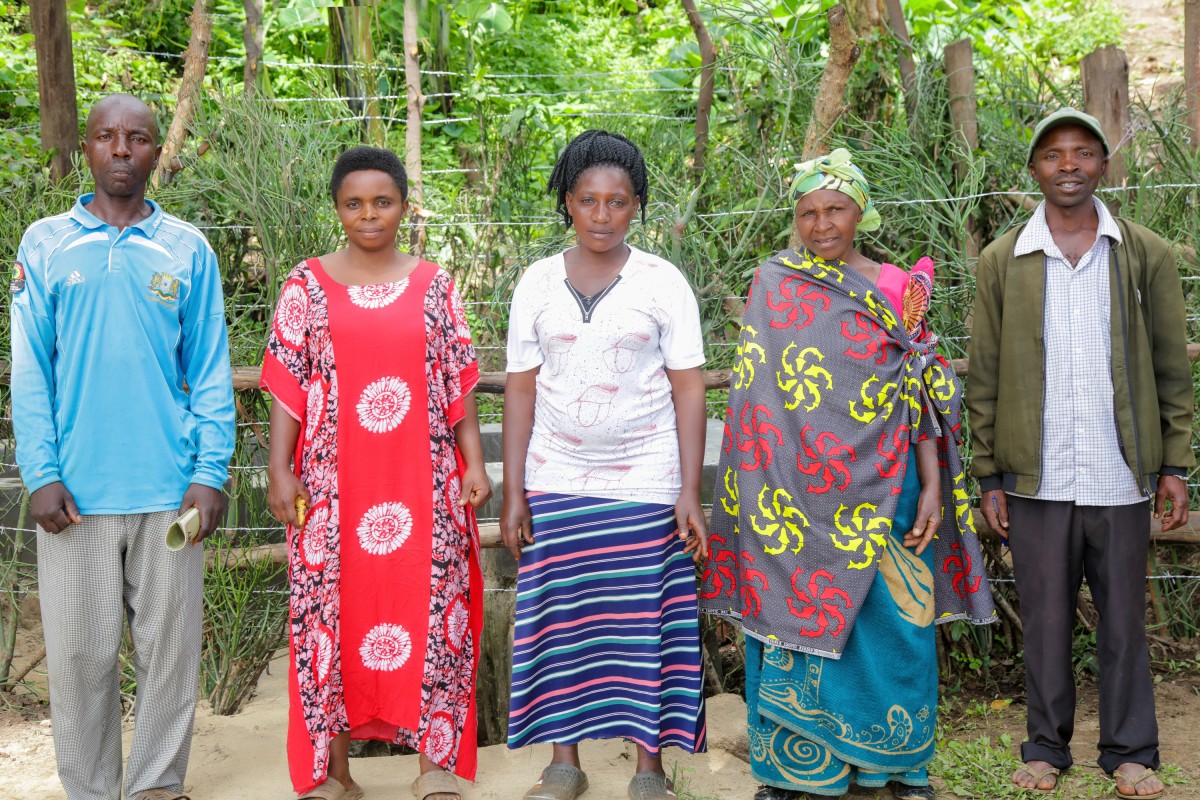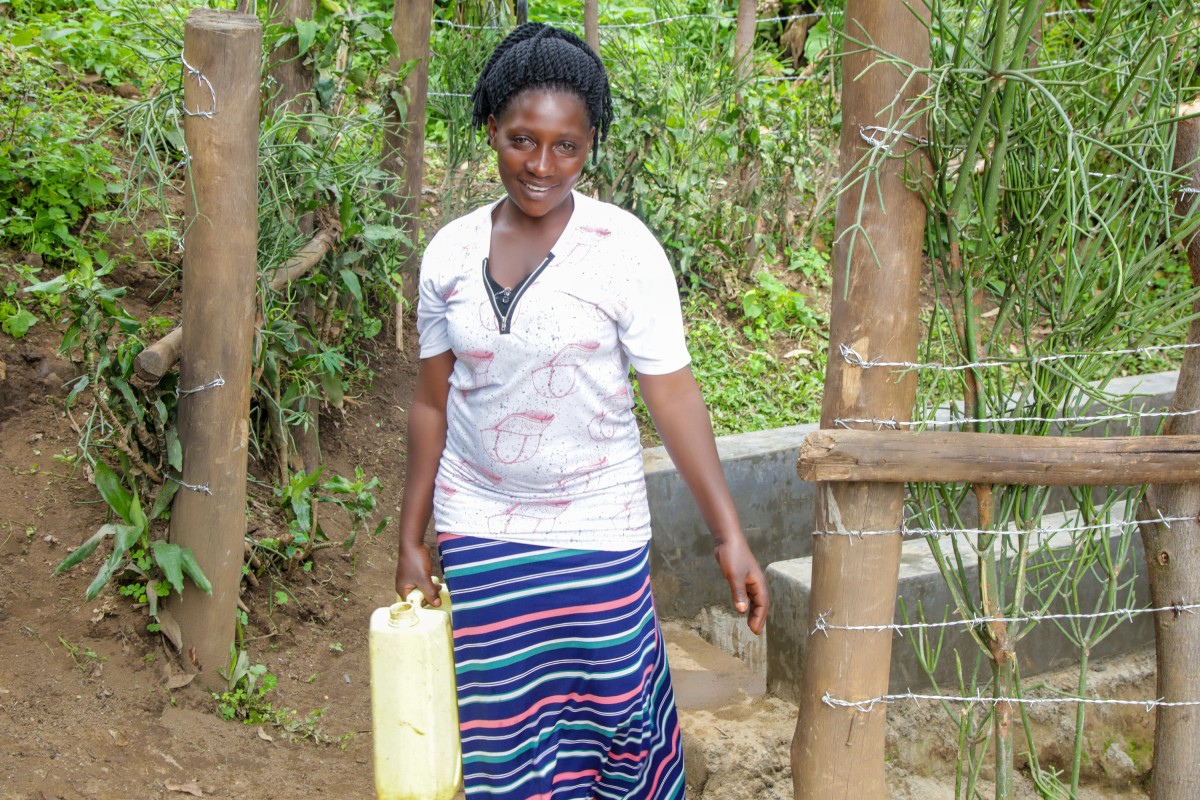Annet Ithungu: ‘Anything men can do, women can do better’
Annet Ithungu chairs the water committee in Karugaya, Uganda. She guides us through this story about water, climate change and gender equality.
Text: Marc Broere, Vice Versa. Photos: Mark Williams, Wasswa
Being the chair of the water committee, Annet Ithungu is one of the leaders in her village. She used to be very shy, but now her ambitions keep on growing, providing a source of motivation for other women in her community. ‘I’m showing them that a woman can lead an organisation and that you can make a positive impact without any man needing to be involved.’ A report.

Sparkling under the beaming sun, the Rwenzori Mountains do justice to their nickname, ‘Mountains of the Moon’. We are in western Uganda, not far from the border with Congo, in the village of Karugaya. It has a population of seven hundred, spread over about 100 households. The area is large, ‘all the way past that hill,’ says Annet Ithungu, pointing her index finger into the distance.
We are welcomed by her, the three other members of the water users’ committee, and the local political leader. Our visit was prompted by an issue in the village, now resolved, in which Ithungu played a crucial role as the chair of the committee.
As we take a walk through part of the village, she talks about the make-up of the community: ‘Most people are farmers, and our main product is coffee – every household has coffee bushes. We also grow beans, potatoes, cassava, and yam, with the staple food being cassava and Irish potatoes.
Zero management of the water source
‘Matoke [the plantain eaten almost daily in most of Uganda, ed.] barely grows here, as it’s unsuited to the soil structure. People also keep some domestic animals like goats and chickens. Most people have lived here for a very long time; it’s the land of their ancestors.’
Access to water is essential in this area, whether for drinking, washing, or spraying the fields when there is an uneven distribution of rainfall like now. All households depend on one natural source of water. Ithungu says everyone has an equal right to water. ‘You can use as much as you want; the source supplies enough.’
However, sufficient water doesn’t necessarily mean clean water. When we arrive at the water source, she says that, until two years ago, people would wash their clothes here, the animals would urinate in it, and there were no management measures in place. ‘Many people suffered from typhoid, worms, and other water-borne diseases.’
Three women and one man
In 2020, the village was visited by JESE, a local development organisation from western Uganda that works together with Simavi. We are also joined today by Richard Alituha from JESE who, having travelled ahead of us on his motorbike, pays almost daily visits to remote villages to talk to the locals and discuss plans to improve their living situation.
They agree that JESE will always cover part of the costs, but that the villagers themselves must also make a considerable contribution – as was the case with the water source in Karugaya, which was completely revamped during a joint effort.
Richard Alituha looks pleased. A sturdy bridge has been built at the water source, providing a much easier, faster connection between the two parts of the village ‘When I first came here, the crossing was extremely difficult,’ he says. It was all slippery, and if a pregnant woman needed to be taken to hospital, the ambulance would have a very tough job trying to collect her. The bridge has also helped increase incomes, as it’s now much easier for truck drivers to collect agricultural crops.’
But what he’s really thrilled about is Karugaya’s water committee, made up of three women and one man. ‘Gender roles were traditionally extremely rigid,’ he says. ‘There was a deep belief that ensuring access to water, for example, was a man’s job.’ ‘There are still some men who question how a woman could issue commands and make decisions. That’s why our projects aim to tell many stories of women who are doing good things, like this water committee in Karugaya and the job Annet is doing in the community.'
Annet Ithungu laughs. ‘Our motto is: anything men can do, women can do much better.’ Alituha nods in agreement. ‘Our experience here and in other villages is that women are more loyal and involved when they commit to something.’

The ‘rehabilitated’ well
And that’s precisely how you would describe Annet Ithungu in her role as the chair of the water committee. We go to sit down under some shady coffee bushes and continue our chat. She takes her youngest daughter on her lap, named Beyoncé, after her favourite singer. Ithungu says she has seven children.
Before leaving us alone with her, Alituha is eager to say a few words about her: ‘This community really believes in her; Annet has the zeal and enthusiasm to make things better here. This water committee was set up by the community itself, which selects the most reliable and committed residents as its leaders.
‘There are two leaders in the village: the political leader and the chair of the water committee, from the community. The two complement each other well. Annet truly has leadership qualities and the patience to deal with people and solve problems.’
She accepts the compliments with a cool smile and retells the story she told earlier: about the dirty water and myriad diseases caused by the water source, about how the community and JESE joined forces to ‘rehabilitate’ the well, and how she played her part in this as a resident of the village. ‘I was always at the well.’
She also recounts how the community unanimously nominated her to chair the committee and how she first discussed the topic with her husband. ‘He also liked the idea and has always supported me,’ she says. ‘He still encourages me and also sees that the water committee has a positive impact on our family – it’s been a long time since our children were last sick.’
She also thinks it makes sense that there are more women than men on the committee. ‘They use water more than men. Who cooks? Who bathes the children? Who washes the clothes? Exactly. That’s why women always monitor the water: they’re more likely to pick up on potential sources of contamination or any other problems around the water source.’
Ithungu has her own personal take on the position of chair. She mobilises people for meetings and has started a savings group for a fund earmarked for repairs to the water source. Each household contributes one thousand Ugandan shillings a month (25 euro cents).
She also acts as a sort of law enforcer: anyone who commits an offence around the water source – washing your clothes near it, letting your cattle drink from it, allowing your children to urinate it, and so on – will be hit with a fine of twenty to thirty thousand shillings. In any case, children under 12 are banned from loitering around the water source. ‘People who can’t or won’t pay the fine are given an alternative punishment, such as digging or sweeping the area around the water source,’ says Ithungu.
Climate change is a major challenge
One of the challenges the community faces is climate change. Together with the government, Ithungu and her fellow villagers talk about planting new trees. There was barely any rainfall in the area between July and August, and the flow from the water source had also decreased. ‘And there’s always the threat of contamination,’ she adds.
‘A strong flow also flushes chemicals out of the well, which then drain off. Dry periods bring a peak in water-borne diseases. We occasionally have to use water from the well to irrigate our crops, whereas we used to get enough water from rainfall.’

Gender equality and social inclusion training
As in other villages, JESE provided training on gender equality and social inclusion in Karugaya. ‘This was sorely needed, as women do most of the work in the fields while men take the lion’s share of the yields. The women now manage the money and take their own produce to the market themselves.’
Very few men attended the training at first, ‘but what was discussed slowly spread through the village,’ says Alituha. ‘They returned with some good stories – which is why I just mentioned how storytelling is so important.’
Ithungu and Alituha light up during moments of reminiscence. ‘There was a heated debate at first, since some men want to be the boss and won’t budge on that,’ says Ithungu.
Alituha responds: ‘That’s right. That shift in behaviour didn’t happen overnight...’ Ithungu continues: ‘Richard mentioned that a positive approach is important.’ ‘You have to show men that women getting more involved is also in the men’s advantage. It means men are free to do other things, like looking for ways to pay their children’s school fees. A healthy community is built on women’s participation.’
‘People will naturally love you’
She says that she enjoys her position and regularly reflects on it. ‘My big ambition is for life in our village to improve. I’ve also come to see myself more and more as a leader with an ability to motivate other women by what I do. I’m showing them that a woman can lead an organisation and that you can make positive impact without any man needing to be involved.’
Well, ‘except him’, she says in jest, pointing to the only male member of the committee, Ezira Bulemu, who holds the position of secretary and takes the minutes of the meetings. He responds immediately: ‘Being the only man doesn’t cause me any bother. Women always know exactly what they’re doing.’ He adds: ‘When women talk about work, they actually mean business. They are extremely hard-working, which is very motivational.’
Ithungu explains how being the chair has a positive effect on her personal development. ‘I learn something new every day, like how people naturally love you when you lead well. I was very shy before I took on the role. A few years ago, I would never have dared to sit opposite you and give an interview. Now I can even address a whole village without feeling nervous and make decisions on behalf of the whole community.’
She will chair the water committee for another three years, after which Annet Ithungu is looking to climb the ranks. ‘The time when women were overlooked when it came to filling important positions is over, thankfully,’ she says. ‘Across the region, I see women doing well. That’s what I aspire to be; I want to lead at a higher level in a few years. With the experience I’ve gained up to now, I’d also feel confident running for political office.'
This article was produced in collaboration with Vice Versa.

